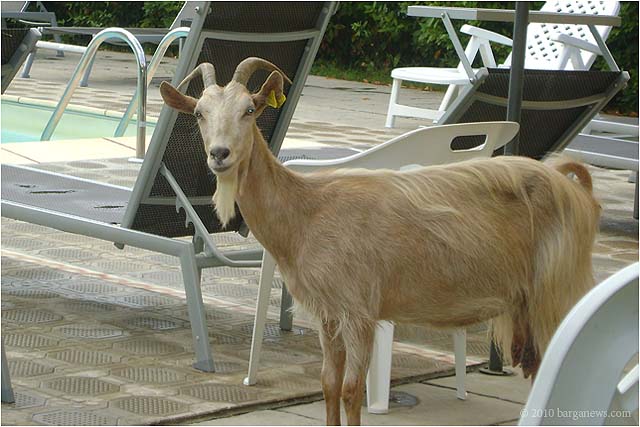 Its almost the end of August and very close to the end of the “silly season” as far as journalism is concerned but who could resist a headline to a story like, ” Goat visits the swimming pool” ? A goat strayed into the gardens of the Hotel Villa Moorings in Barga Giardino and decided that by the pool was the coolest place to be on a warm summer day. The arrival of various armed Carabinieri, the odd veterinary surgeon and officials from the local health authority all did nothing to change the mind of the sunbathing goat until later on in the morning the late entrance into the Villa of the owners of the goat finally persuaded the animal that enough was enough and it was time to return home.
Its almost the end of August and very close to the end of the “silly season” as far as journalism is concerned but who could resist a headline to a story like, ” Goat visits the swimming pool” ? A goat strayed into the gardens of the Hotel Villa Moorings in Barga Giardino and decided that by the pool was the coolest place to be on a warm summer day. The arrival of various armed Carabinieri, the odd veterinary surgeon and officials from the local health authority all did nothing to change the mind of the sunbathing goat until later on in the morning the late entrance into the Villa of the owners of the goat finally persuaded the animal that enough was enough and it was time to return home.
The silly season is the period lasting for a few summer months typified by the emergence of frivolous news stories in the media. This term was known by the end of the 19th century and listed in the second edition of Brewer’s Dictionary of Phrase and Fable and remains in use at the start of the 21st century. The fifteenth edition of Brewer’s expands on the second, defining the silly season as “the part of the year when Parliament and the Law Courts are not sitting (about August and September)”.
Other countries have comparable periods, for example the Sommerloch (“summer [news]hole”) in Germany; French has la morte-saison (“the dead season” or “the dull season”), and Swedish has nyhetstorka (“news drought”). A silly season news item is called rötmånadshistoria in Sweden and Mätäkuun juttu in Finland, both literally meaning “rotting-month story”.
In Spain the term serpiente de verano (“summer snake”) is often used.




